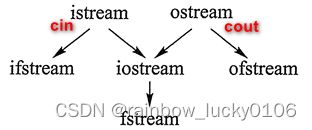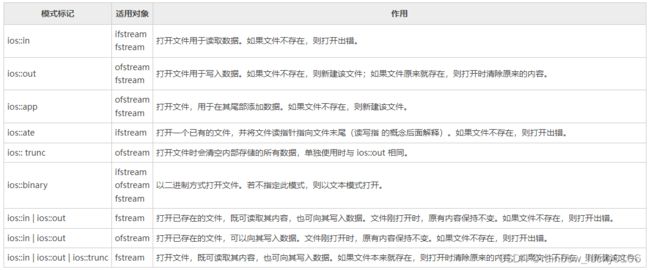C\C++\QT文件操作:流读写\内存映射
文章目录
- 文件
-
- 打开方式:文本 vs 二进制
- C\C++文件操作
-
- 常规(C)
- 文件流(推荐)
-
- 基本操作
-
- fstream
- 文本文件读写:流运算符
- 二进制文件读写:ofstream::write() \ ifstream::read()
- std::locale::global() 支持中文路径
- 获取文件大小
- 写入文件内容到结构体
- 获取读取的字节数
- 打开模式
- 保护模式
- 删除文件
- QT文件操作
-
- 基本读写操作
- 流操作QTextStream\QDataStream
- 文件内存映射
- 文件对话框QFileDialog
文件
文件可分为文本文件、视频文件、音频文件、图像文件、可执行文件等多种类别(格式)。
所谓“格式”,就是关于文件中每一部分的内容代表什么含义的一种约定。
- 常见的纯文本文件(也叫文本文件,扩展名通常是“.txt”),指的是能够在 Windows 的“记事本”程序中打开,并且能看出是一段有意义的文字的文件。文本文件的格式可以用一句话来描述:文件中的每个字节都是一个可见字符的 ASCII 码。
- 除了纯文本文件外,图像、视频、可执行文件等一般被称作“二进制文件”。二进制文件如果用“记事本”程序打开,看到的是一片乱码。
打开方式:文本 vs 二进制
std::ifstream in("file.txt", std::ios::binary);
无论是否指定二进制方式打开文件,读写的最小单位都是字节。
二进制方式打开 VS 普通打开:
- 在 UNIX/Linux 平台中,用文本方式或二进制方式打开文件没有任何区别。以
\n(ASCII 码为 0x0a)作为换行符号。 - Windows换行符:两个字符
\r\n(\r的 ASCII 码是 0x0d)。- Windows + 文本普通方式读取文件:系统会将文件中所有的
\r\n转换成一个字符\n(0x0d0a =》系统丢弃前面的 0x0d 字节,只读入 0x0a)。而linux下会读入0D 0A两个字符。 - Windows + 文本普通方式写入文件:系统会将写入的
\n转换成\r\n存储(如果要写入的内容中有字节为 0x0a,则在写入该字节前,系统会自动先写入一个 0x0d)。
- Windows + 文本普通方式读取文件:系统会将文件中所有的
=》因此,如果用文本方式打开二进制文件进行读写,读写的内容就可能和文件的内容有出入。因此,用二进制方式打开文件总是最保险的(更贴近原样)。
- Windows + ios::binary方式写入:换行符存储为单字符。和Linux表现一致。
- Windows + ios::binary读取:如果文件中本来存在0D 0A两个字符(即文件是windows格式),windows 和 linux下均会读入0D 0A两个字符。
【C++】ios::binary是干嘛的?
C\C++文件操作
常规(C)
文件流(推荐)
3 个文件流类:
基本操作
fstream
文本文件读写:流运算符
>>:输入流运算符
<<:输出流运算符
ifstream srcFile("in.txt", ios::in); //以文本模式打开in.txt备读
ofstream destFile("out.txt", ios::out); //以文本模式打开out.txt备写
if (!srcFile || !destFile) { //打开失败
return;
}
while (srcFile >> x) { // 像用cin那样用ifstream对象
destFile << x << " "; // 像 cout 那样使用 ofstream 对象
}
destFile.close();
srcFile.close();
二进制文件读写:ofstream::write() \ ifstream::read()
const char *chText ="xxxxxx";
fstream fs("test.txt", ios::out | ios::binary);
// fstream fs; //创建一个 fstream 类对象
// fs.open("test.txt", ios::out); //将 test.txt 文件和 fs 文件流关联
fs.write(chText, 30); //向test.txt文件中写入 url 字符串
fs.close();
std::locale::global() 支持中文路径
当传递NULL作为参数时,会调用local对象的一个显示默认构造函数,新构造出的对象包含当前系统的默认locale,随后的代码会比较当前本应用程序正在使用的locale是否和这个local对象所代表的locale一致,不一致的话则将这个local对象所携带的locale设置为新的locale,并返回之前正在使用的locale。
ofstream ofs; //打开文件用于写,若文件不存在就创建它
locale loc = locale::global(locale("")); //要打开的文件路径含中文,设置全局locale为本地环境
ofs.open("./out.bin",ios::out| ios::app | ios::binary,_SH_DENYNO); //输出到文件 ,追加的方式,二进制。 可同时用其他的工具打开此文件
locale::global(loc); //恢复全局locale
if (!ofs.is_open())return; //打开文件失败则结束运行
char* buffer = "fdsfdsfdsfdsfdsfds\n";
ofs.write(buffer, sizeof(char)*17);
ofs.flush();
Sleep(1000);
ofs.close();
文件操作std::locale::global(std::locale(“”))的作用
获取文件大小
ifstream使用seekg和tellg:
ifstream fsRead;
fsRead.open(srcFilePath.c_str(), ios::in|ios::binary);
if (!fsRead) {
return;
}
fsRead.seekg(0, fsRead.end); // 搜索到文件末尾
size_t srcSize = fsRead.tellg(); // 文件大小
if (!srcSize) {
fsRead.close();
}
fsRead.seekg(0, 0); // 还原到文件开头
ofstream使用seekp和tellp:
ofstream fsWrite;
fsWrite.open(destFilePath.c_str(), ios::out|ios::binary);
if (!fsWrite) {
fsRead.close();
return;
}
fsWrite.seekp(0, fsWrite.end);
size_t dstFileSize = fsWrite.tellp();
seekg 和 seekp 的参数通常是一个长整型。第二个参数可以用于指定查找方向。查找方向可以是 ios::beg(默认的,从流的开头开始定位),也可以是 ios::cur(从流的当前位置开始定位),也可以是 ios::end(从流的末尾开始定位)。
fileObject.seekg( n ); // 定位到 fileObject 的第 n 个字节(假设是 ios::beg)
fileObject.seekg( n, ios::cur ); // 把文件的读指针从 fileObject 当前位置向后移 n 个字节
fileObject.seekg( n, ios::end ); // 把文件的读指针从 fileObject 末尾往回移 n 个字节
fileObject.seekg( 0, ios::end ); // 定位到 fileObject 的末尾
fstream 获取文件大小_c++获取文件大小
使用C++文件流(fstream),如何确定文件的大小?
写入文件内容到结构体
Student st;
fstream fs;
fs("test.txt",ios::out | ios::binary);//binary二进制输出
if(fs)
{
fs.write(reinterpret_cast<char*>(&st), sizeof(st));
//fs.write((char*)(&st),sizeof(st));
fs.close();
}
Writing binary with ofstream.
利用fstream写入结构体(二进制写入)
C++ fstream读取结构体出错问题解决
获取读取的字节数
ifstream ifs("a.txt");
char buf[1024];
ifs.read(buf, 1024);
size_t extracted = ifs.gcount();
std::ifstream::readsome和std::ifstream::read的区别
打开模式
保护模式
#define _SH_DENYRW 0x10 /* deny read/write mode */拒绝对文件进行读写
#define _SH_DENYWR 0x20 /* deny write mode */拒绝写入文件
#define _SH_DENYRD 0x30 /* deny read mode */拒绝文件的读取权限
#define _SH_DENYNO 0x40 /* deny none mode */读取和写入许可
#define _SH_SECURE 0x80 /* secure mode */共享读取,独占写入
//注意:假设A进程以_SH_DENYRW 打开,那么是B进程不能再对文件进行读写。
C++文件操作
ofstream文件输出流把二进制数据写入文件
删除文件
int remove(const char * filename);
QT文件操作
基本读写操作
QFile file(fileName); // fileName文件的路径
if(file.open(QIODevice::ReadOnly | QIODevice::Text)) // 以读写的方式打开文件
return ;
while (!file.atEnd()) {
QByteArray line = file.readLine();
}
流操作QTextStream\QDataStream
QFile file("in.txt");
if (!file.open(QIODevice::ReadOnly | QIODevice::Text))
return;
QTextStream in(&file);
while (!in.atEnd()) {
QString line = in.readLine();
}
QFile Class
文件内存映射
uchar *QFileDevice::map(qint64 offset, qint64 size, QFileDevice::MemoryMapFlags flags = NoOptions)
从偏移量开始将文件的大小字节映射到内存(虚拟内存)中。应该打开一个文件以使映射成功,换句话说就是映射必须打开一个文件,但在映射内存之后,该文件不需要保持打开状态。当QFile被销毁或用这个对象打开一个新文件时,任何未被映射的映射都将被自动取消映射。
在处理数据量较大的文件时,往往需要使用文件映射技术,即虚拟内存。 通过文件映射之后,就可以像操作内存一样去直接操作文件。而不需要再调用文件读写方法了。
给磁盘上的文件分配地址,类似内存的地址一样,对虚拟出来的内存的操作就是对文件的操作了。
qt的内存映射
Qt——文件映射
文件对话框QFileDialog
QString strFileName = QFileDialog::getOpenFileName(this, tr("Open Image"), "/home/", tr("Image Files (*.png *.jpg *.bmp)"));

